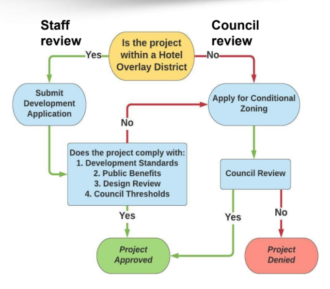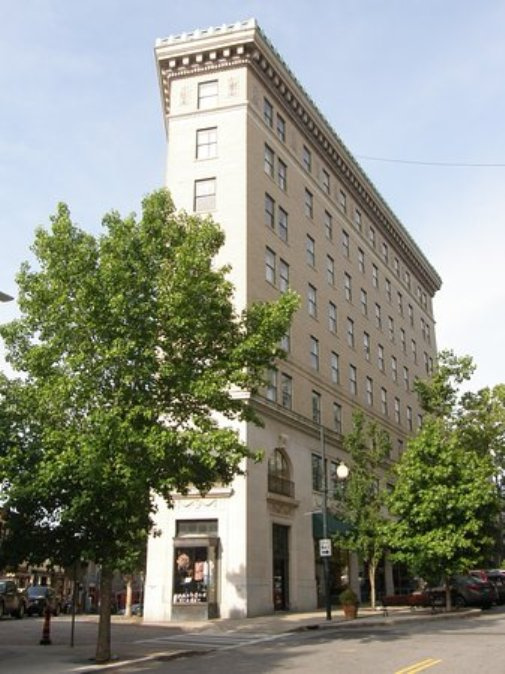Two work sessions, a complicated flow chart and lengthy back-and-forth have brought Asheville City Council a little closer to agreement on an approach to hotels. With the city’s hotel development moratorium set to expire on Tuesday, Feb. 23, time is running out.
After growing community frustration that too many hotels were popping up within Asheville’s city limits, Council approved a one-year pause on all hotel development last September and extended the moratorium on Sept. 22. During that time, city staff members have been drafting guidelines to clearly outline requirements for new lodging projects, as presented during Council work sessions on Oct. 13 and 27.
In response to Council direction that the rules incentivize public benefits and limit where hotels can be built,Todd Okolichany, Asheville’s planning and urban design director, proposed a detailed system for evaluating lodging developments. Four areas are included: location, public benefits, development standards and design.
Under Okolichany’s new plan, if a project were to fall within a designated hotel zoning district, meet all city development standards, pass a design review and score enough public benefit points, the hotel could be approved without Council review. Failure to meet any one of the criteria would trigger an application for conditional zoning, and the project would go before Council for a vote, as hotels of more than 20 rooms have since February 2017.

But each of those criteria drew discussion and debate among Council members. Outgoing member and outspoken hotel critic Brian Haynes said he felt “defeated” by the current proposal.
“If we’re going to do this, we’ve got to come up with a much stronger way, so that rather than seeing 10 or 15 hotels come in the first year that we do this, it becomes such a stringent process that maybe we get one or two,” he said at the end of the Oct. 13 session. “If we don’t do that, in my opinion, we’ve failed.”
The proposed hotel overlay district — which would limit hotels with 35 or more rooms to the east and west outskirts of downtown, River Arts District and Biltmore Village, as well as along Tunnel Road and Smokey Park Highway and near the Asheville Outlet Mall — is too big, members agreed. Vice Mayor Gwen Wisler suggested excluding the Asheville Mall and the River Ridge shopping center from the map to preserve those sites for future mixed-use development.
Wisler also proposed adding a 100-room cap as a development standard, forcing all larger proposals to come before Council. But while a room threshold may limit large proposals, it would likely incentivize developers to bring forward smaller projects, noted Mayor Esther Manheimer. Keith Young, the only member of Council currently running for reelection, agreed.
Sheneika Smith and recently appointed Council member Antanette Mosley advocated for allowing a maximum number of hotels per block or imposing a spacing requirement to keep development from occurring within a certain distance of existing hotels. Julie Mayfield countered with a suggestion for “sacrifice zones,” or areas specifically designated for hotel growth, to keep development limited to one section of the city.
Per staff’s proposal, any hotel project would also need to earn a set number of points by including items from a tiered public benefits matrix. Potential criteria include donations to Asheville’s Housing Trust Fund, assuring a living wage for all employees and sustainability certification. Displacement of existing businesses and housing would result in negative points.
Council members agreed that projects should be required to meet at least one of the larger items, such as affordable housing or environmental standards, instead of cobbling together several low-scoring items to reach the threshold. Smith suggested that some benefits like a living wage and bus passes for hotel employees should be coupled; Manheimer took the idea a step further by proposing a tiered benefit system for certain contributions, allowing hotels to earn additional points by combining Council priorities.
A final draft of the regulations is expected to return to Council on Tuesday, Jan. 26, followed by a formal vote on Tuesday, Feb. 9. A new Council will be seated for that vote following the general election of Tuesday, Nov. 3.




The headline should be: City Council Fails… There isn’t much this council hasn’t failed at. Maybe it could be a 10 part series. They’ve hidden so well during the protesting, pandemic and panhandling I wasn’t sure we still had a city council.
A triumph of bureaucracy, then. Literally a box-checking exercise, and per Goodhart’s Law, when measures become targets, they cease to be useful measures. There is no way this isn’t going to be gamed up the wazoo.
“Potential criteria include donations to Asheville’s Housing Trust Fund, assuring a living wage for all employees and sustainability certification. Displacement of existing businesses and housing would result in negative points. ”
Asking developers to chip in to the Housing Trust Fund is a failure.
Too much traffic, too many big buildings, says Asheville, then wonders why dense affordable housing is scarce.
Too many hotels, says Asheville, then wonders why all the long-term housing has converted to Airbnbs.
Too many Airbnbs and too many hotels, says Asheville, then wonders why long-term rentals are converting to Airbnbs where allowed.
Such mysteries.
Pushing hotel growth, which will occur, just outside the geographic reach of our politburo will add traffic and congestion. When the govt comes to help…..
Airbnbs are good such much of Asheville, then wonders why there is not enough affordable housing.
That would make sense if there were actually tens of thousands of Airbnbs in Buncombe County. But there aren’t. We are tens of thousands of units behind in housing inventory—converting every single Airbnb to long term rental (where it even makes sense, most ADUs would never have been built if they only had the option of going LTR!) would do nothing to lower prices or increase the vacancy rate.
Once again it’s worth looking at a satellite image that shows the city limits of Asheville and note that what would, in most other cities, be a southwest quadrant is instead an 8,000-acre private estate in the unincorporated county and an enclave. That’s not to say there isn’t room for incremental infill development, but affordability has largely been pushed out of the city (often on random parcels that the county then has to accommodate after the fact) and to some degree out of the county.
And if you have evidence that building more hotels would significantly reduce demand for AirBnBs within the city limits, I’m all ears.
But hey, we could always build on the golf courses.